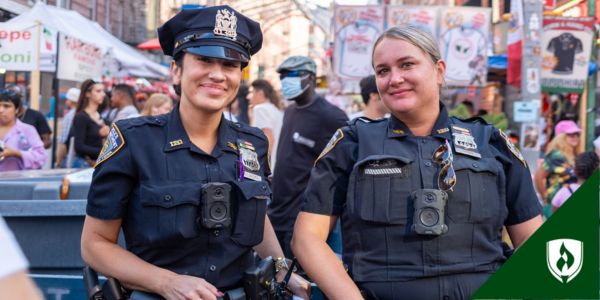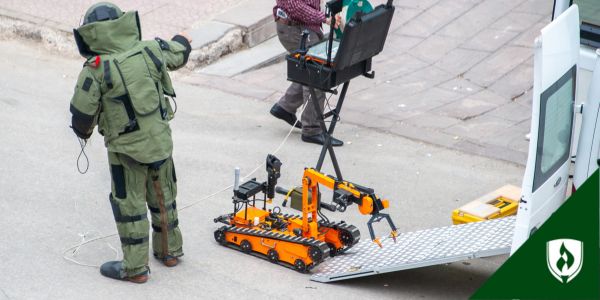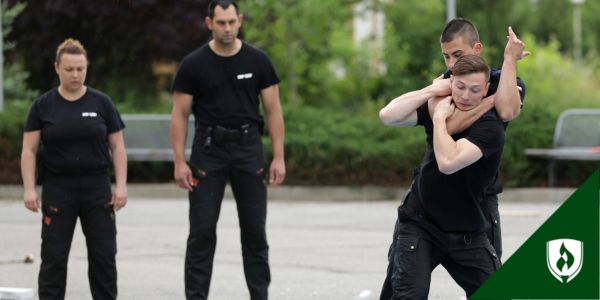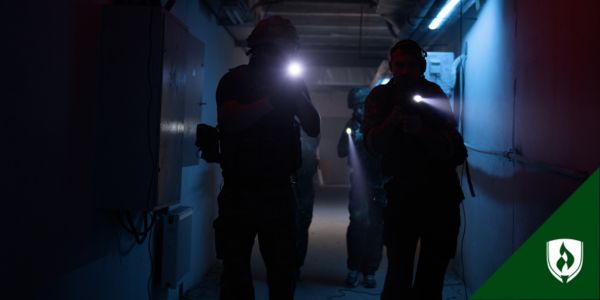Life as a parent is jam-packed with responsibilities. If it’s not doctor’s appointments or missed school buses, it’s helping with homework and bedtime stories. For a while now, life outside of being a parent seems to have moved to the backburner. But now that the kids are getting a little older, you’re starting to explore some options—among them finding work as a police officer.
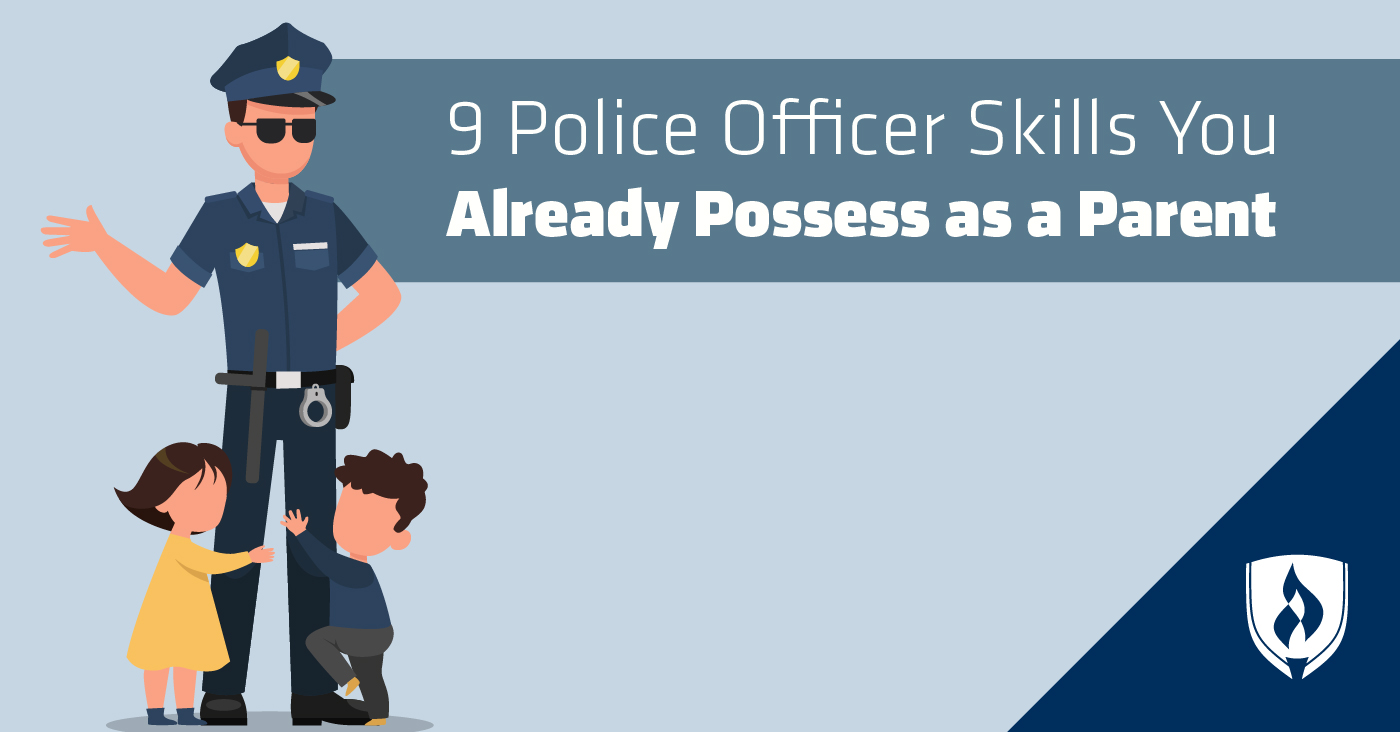
But what you may not realize is that you already have some of the skills needed for a job in law enforcement.
In fact, you already perform several basic police officer skills on a daily basis. Becoming a law enforcement officer will allow you to capitalize on many of the things at which you excel. You’ll continue being a great role model for your children and you’ll get the added benefit of providing safety to your surrounding community. Check out our article on "What Makes a Good Police Officer" to further explore the skills and qualities that align with your strengths.
9 Ways you already operate like a police officer
While obviously there’s some big differences between wrangling your kids and catching criminals, your parenting experience has likely honed many of the following traits and skills. If you’re considering a career in law enforcement, read on for a somewhat lighthearted look at how parenting has readied you for patrol.
1. You are protective
The primary duty of police officers is to protect lives and property. Ensuring the safety of the general public is an absolute must in this career, and we all sleep easier at night because of it. People rely on police officers to provide the necessary protection not only for their own lives, but for the lives of their family and friends.
How parenting helps: The moment your child was born, you started your new full-time job as unofficial security guard. During every walk to the park or trip the grocery store, you’re on high alert, ensuring your little one stays out of harm’s way. You’re constantly scanning the streets for trouble and you have a seemingly innate ability to sense danger from a mile away. The fact that you would do whatever it takes to keep your neighborhood safe makes you the perfect police officer candidate.
2. You communicate and coordinate
Police officers are individual components of a greater unit. In order to work as a team with those behind the scenes and on the front lines, clear communication and coordination are crucial. This skill set is never more apparent as when officers respond to calls for assistance, interview potential witnesses, gather facts and information and write reports.
How parenting helps: You and your significant other have been putting on a master class of coordination and communication (almost) every week. You talk through upcoming events and come up with a plan of action for getting kids where they need to be and pay close attention to the assignments they better be keeping up on.
And when things really start getting hectic? You know how to put your foot down and use your commanding voice to let them know you mean business. You’ve learned to pay attention to the facts, prioritize, speak confidently and get things done promptly, which will prove useful as a police officer in the line of duty.
3. You are strong
Although physical fitness tests will vary depending on state guidelines and individual departments, no one can dispute that physical fitness is a necessary component to perform police duties safely and effectively. If a suspect flees a scene or resists arrest, the acting officer must be prepared to respond with the appropriate amount of force to gain control over the situation.
How parenting helps: Anyone who’s ever felt the biceps of a parent with young children will consider this one a no-brainer. As a parent you are accustomed to popping your son or daughter on your hip, back or shoulders when their little legs grow too tired to walk.
You’re probably also used to carrying your body weight in backpacks filled with snacks, diaper bags, first-aid kits and changes of clothes at every family outing. Coupled with miles of walking behind a stroller, endless crouching during hide-and-seek and hours of bench presses playing “airplane,” your body is accustomed to a basic level of physical fitness. All of this will serve as a great starting point for the physical aspect of police training.
4. You know how to take care of people
Police officers are often the first responders to emergency situations, whether it’s an at-home accident or a car-crumpling crash. Although they’re not always trained to be EMTs, officers are expected to provide initial aid to victims who’ve suffered physical injury.
How parenting helps: You may not be able to perform emergency surgery, but when your daughter crashes her bike into a fence after swerving to avoid the neighbor’s cat, you can patch up that skinned knee without a hitch. Your son’s penchant for pandemonium has probably made you quite familiar with the importance of direct pressure on an open wound. You’ve already started building your first-aid repertoire, which will help tremendously in your police officer training.
5. You’re a good problem solver
As a police officer, it’s up to you to quickly determine the best course of action for any situation—no matter how dire it may seem. Officers are expected to be resourceful on the job, to show initiative and to be assertive. It is important for police officers to keep their heads on straight and act quickly in response to chaotic circumstances.
How parenting helps: Children are unpredictable. Sometimes they crash into bookshelves after jumping from top bunks. Sometimes your 3 year old darling manages to lock himself in a room. And often—whether it’s a nightmare, boogie man or a chart-topping fever—kids start crying in the middle of the night. Regardless of the circumstance, you’ve become a master at thinking on your feet. Remedying the situation might mean making a finger splint out of a Popsicle stick, taking an online crash course in lock picking or running to the nearest 24-hour drug store in your pajamas, but you’ll do what’s necessary to get the job done.
6. You have eyes in the back of your head
Surveillance is one of the most importance skills for police officers. Whether it’s staking out a freeway for drunk drivers or noticing something out of the ordinary on your daily route, this profession requires keen observation skills.
How parenting helps: You know that feeling when the house goes quiet—too quiet. As a parent, you have to keep track of your kids at all times. When they sneak away with the cookie dough, steal their little sister’s toys or decide midnight is a good time for a game of hide-and-seek you know how to read the signs and follow the trail to a guilty suspect.
7. You are well versed in crowd control
When a peaceful protest goes wrong or a Black Friday sale turns sour, police officers will need a strong presence to command order and restore the peace. Backup isn’t always going to be there immediately, and sometimes officers need to know how to keep sometimes chaotic situations from getting worse.
How parenting helps: Remember when you invited your son’s entire 3rd grade class over for his birthday party? Maybe planning a game of tag in the house wasn’t the best idea… But you wrangled those kids to safety within seconds of a glass lamp toppling. As a parent, you know how quickly the energy of a crowd can get carried away. You can sense when the need for an intervention is necessary. This combined with the ability to redirect the energy will serve you well as a police officer.
8. You ask the right questions
When it comes to interviewing witnesses, a police officer needs to know how to make people feel comfortable enough to talk. They need to approach the right topics in the right way in order to get the information they need. Police officers need to be confident but casual, direct but delicate.
How parenting helps: “Who broke the remote?” “Did your sister hurt your feelings?” From finding the culprit to identifying the victim, you are a pro at getting information from reluctant kids. While adult witnesses will be a little different, you will apply the same sensitivity and persistence in finding the truth as a police officer.
9. You know how to manage competing interests
Customer service skills are well exercised by any police officer. When one person’s dog keeps getting out of their yard but another neighbor’s dog broke their fence in the first place, you will need to handle two conflicting perspectives and reach a reasonable resolution. This kind of interpersonal interaction is perhaps one of the most important skills an officer can have as it directly relates to building connections with the community.
How parenting helps: Your daughter wants to eat dessert for dinner. Your son says he’s starving for “big boy” food. Meanwhile you haven’t been to the grocery store in a week. Tantrums are on the horizon. As a parent, you are an expert at satisfying everyone’s needs. Not everything goes perfectly every time and rarely everyone gets exactly what they want, but you know how to help everyone meet in the middle.
Sharpen your police officer skills
If you can identify with these important police officer skills through your parenting experience, take the next step to leverage your instincts in an exciting career as a police officer. Start investigating the path ahead in our article, “How to Become a Police Officer: Your Step-by-Step Guide.”
Interested in different types of law enforcement? Check out our article about Conservation Officers.
EDITOR’S NOTE: This article was originally published in 2014. It has since been updated to include information relevant to 2019.

